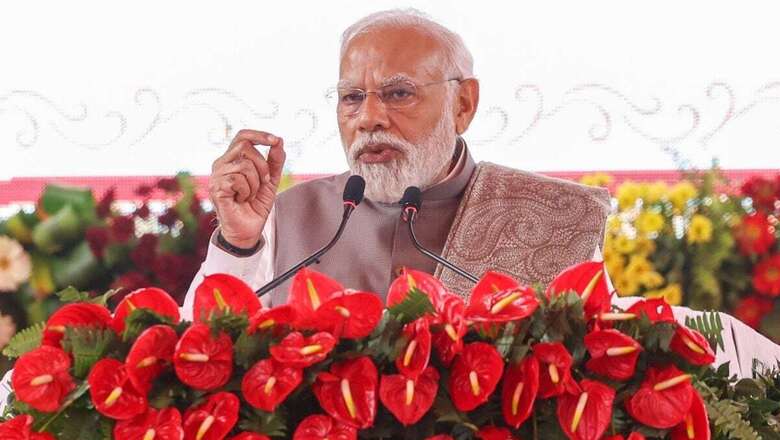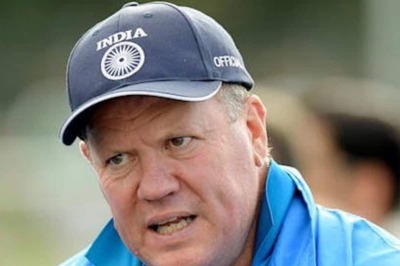
views
Prime Minister Narendra Modi, in his first response to US’ allegations of a plot to kill Khalistani leader Gurpatwant Singh Pannun, said India was “deeply concerned about the activities of certain extremist groups based overseas”.
In an exclusive interview with the Financial Times, the prime minister added: “These elements, under the guise of freedom of expression, have engaged in intimidation and incited violence.”
India has consistently tried to draw the world’s attention towards extremist groups, much to the chagrin of Western powers. The most recent fallout was the India-Canada diplomatic row that erupted after Canadian prime minister Justin Trudeau hinted at the “potential” involvement of Indian agents in the killing of Khalistani separatist Hardeep Singh Nijjar on June 18 in British Columbia. India had designated Nijjar as a terrorist in 2020.
While India rejected Trudeau’s allegations as “absurd” and “motivated”, the prime minister said his decision to make allegations in public was intended to “put a chill” on India from repeating a similar action.
India was caught in a similar bind with regards to the United States as it was revealed that the US has charged Nikhil Gupta, 52, with murder-for-hire, which carries a maximum sentence of 10 years in prison, and conspiracy to commit murder-for-hire, which carries a maximum sentence of 10 years in prison. US authorities said Gupta agreed to pay an assassin $100,000 to kill Sikh separatist leader Gurpatwant Singh Pannun living in New York City.
In his first response to the allegations, PM Modi on Wednesday said: “If someone gives us any information, we would definitely look into it. If a citizen of ours has done anything good or bad, we are ready to look into it. Our commitment is to the rule of law.”
However, he denied that the charges would lead to a diplomatic flare-up like in the case of Canada.
“There is strong bipartisan support for the strengthening of this relationship, which is a clear indicator of a mature and stable partnership. Security and counter-terrorism co-operation has been a key component of our partnership.” He added, “I don’t think it is appropriate to link a few incidents with diplomatic relations between the two countries.”
India’s foreign ministry had earlier announced that New Delhi had set up a high-level committee to investigate the US allegations and would “take necessary follow-up action”.
PANNUN: INDIA’S HEADACHE
US-based Khalistani separatist and chief of the proscribed organisation Sikhs for Justice (SFJ) Gurpatwant Singh Pannun has been on the radar of Indian agencies.
In his latest hate speech, Pannun asked whether PM Modi, External Affairs Minister S Jaishankar and NSA Ajit Doval “have 24/7 security blanket”. Calling them the “axis of evil”, Pannun threatened they should be “ready to face consequences” and mentioned the killing of Khalistani separatist Hardeep Singh Nijjar in Canada the firing of the “first bullet” by India. Marking 180 days since Nijjar’s murder, Pannun boasted about the show of violence by Khalistani sympathisers in Vancouver.
New Delhi has also repeatedly flagged threats by Khalistani elements and violent demonstrations against India on its soil to Canadian authorities, but to no avail. External Affairs Ministry spokesperson Arindam Bagchi had said earlier that India has taken up with the US and Canada the recent threats made against India by Pannun.
Last month, Pannun had released a video threatening passengers of Air India flights on November 19. He had also issued threats to attack India’s Parliament in response to an alleged failed murder plot to kill him.
In a video featuring a poster of the 2001 Parliament attack convict Afzal Guru with the caption ‘Delhi Banega Khalistan‘, Pannun said he would respond to the failed conspiracy by Indian agencies to kill him by attacking the Parliament on or before December 13.
“My Response on 13 December Will Be In Contrast To 2001 Afzal Gurus Resistance Against Extrajudicial Killings of Kashmiris But is going to Still SHAKE the very foundations of India’s Parliament. Delhi BanayGa Khalista’,” Pannun said.
Earlier, rejecting the Indian government’s decision to label him a terrorist, Pannun said: “We are the ones who are fighting India’s violence with words. We are fighting India’s bullets with the ballot. They are giving money, hundreds of thousands, to kill me. Let the world decide who is a terrorist and who isn’t.”
US, CANADA SILENT ON THREAT?
On the issue of Gupta, a senior Intelligence official told CNN-News18 that the arrest was meaningless. “Americans are suddenly trying to connect this to a government role. We have been sharing evidence against Pannun with US. Their response to the evidence should have been quicker. They keep mum when he threatens the Indian Prime Minister, the External Affairs Minister and the National Security Advisor on a daily basis.”
According to a report in the Financial Times, the US, Canada and allies shared details as part of being in the intelligence-sharing network ‘Five Eyes’. The Nijjar killing and the Pannun assassination plot have sparked concerns “about a possible pattern of behaviour” on Delhi’s part.
“Washington shared details of the Pannun case with a wider group of allies after Trudeau went public with details of the Vancouver killing, the combination of which sparked concern among allies about a possible pattern of behaviour,” the report stated.
Pannun, who is a dual citizen of the US and Canada, is the self-proclaimed general counsel of “unlawful association” Sikhs for Justice (SFJ). He has been under the NIA’s lens since 2019, when the anti-terror agency registered its first case against him.
Pannun was listed as an “individual terrorist” by the ministry of home affairs on July 1, 2020, a year after the Centre banned the SFJ.
When it comes to Canada, New Delhi has raised strong concerns about the continuous anti-India activities perpetrated by Khalistani separatist groups in Canada.
On the sidelines of the G20 summit, PM Modi pointed out to Trudeau that in recent years, Khalistani separatists have used Canadian soil to promote secessionism, the ministry of external affairs said in a press release. PM Modi told Trudeau that these Khalistani extremists have incited violence against Indian diplomats, damaged diplomatic premises and threatened the Indian community in Canada and their places of worship.
Earlier in July, India summoned the Canadian envoy and issued a demarche over the increasing activities by pro-Khalistani elements in Canada. The action was taken after the separatists, who are known to have connections with Pakistan’s secret services, released some posters with names of certain Indian diplomats.
“The nexus of such forces with organised crime, drug syndicates and human trafficking should be a concern for Canada as well. It is essential for the two countries to cooperate in dealing with such threats,” the Prime Minister told his Canadian counterpart, according to the press release.
At least half a dozen cases have been reported from Canada where Khalistani separatists have vandalised temples in the nation by spraying anti-India graffiti and threatening to harm worshippers who visit those places and in certain cases these separatist groups have also attacked Canadian Indians, members of the Indian community and Sikhs who do not subscribe to their ideology.
India has repeatedly claimed that Canada is a safe haven for terrorists and criminals. The NIA has released a list of 43 individuals, some of whom are suspected of being linked to a gangster network operating from Canada. India has handed over dossiers to Canada multiple times, but no action has been taken against these groups. Citizens now allege that Canada is bearing the brunt of not taking action against these groups and criminals.















Comments
0 comment